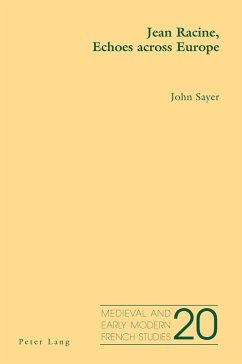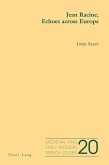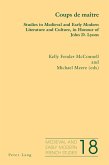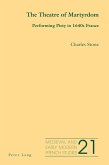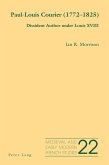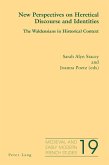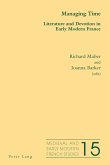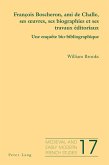Rich with examples of Racine's impact across generations on stage and page, of the inspiration of leading actors across borders, and of the influence of his tragedies, their mostly classical and biblical themes brought in the finest verse or in translation, on European courts, townships, amateur theatre, education at home and school, opera and oratorio, other literatures, art and sculpture, this book follows these many echoes far beyond performances in Paris and at Versailles alone and opens up vistas for further exploration across cultural and political borders. The promotion of Racine's mastery to champion or to challenge successive regimes at home, or to assert French cultural supremacy abroad, and the sheer volume of translations, musical adaptations and borrowings of each play across Europe, are brought together for the first time, offering a fresh perspective not just of reception but of dissemination and active response.
Hinweis: Dieser Artikel kann nur an eine deutsche Lieferadresse ausgeliefert werden.
Dieser Download kann aus rechtlichen Gründen nur mit Rechnungsadresse in A, D ausgeliefert werden.
Hinweis: Dieser Artikel kann nur an eine deutsche Lieferadresse ausgeliefert werden.
«John Sayer is a superb guide, always informed and always courteous, as he leads us on a tour of the courts, theatres, schools and publishing houses of Europe to which Racine was, for a good two centuries after his death, an abiding source of inspiration and also a touchstone by which changing tastes and preferences could repeatedly be assessed. Sayer's study not only sheds light on the reception of Racine's most celebrated tragedies but allows room for consideration of his lesser known works, and Sayer interests himself also in the comparative neglect, and the reasons for it, suffered periodically by such works as Bérénice. Sayer picks up echoes of Racine in a multitude and a variety of places which encompass translations, biographies, textbooks, operas and other adaptations. He always trains a wise and critical ear to these resonances and, in the process, leaves us in no doubt as to the stature of Racine as both a French writer par excellence and a genius central to the prestigious but self-questioning culture of Europe throughout the eighteenth and nineteenth centuries.» (Dr John Leigh, Fitzwilliam College, Cambridge)

